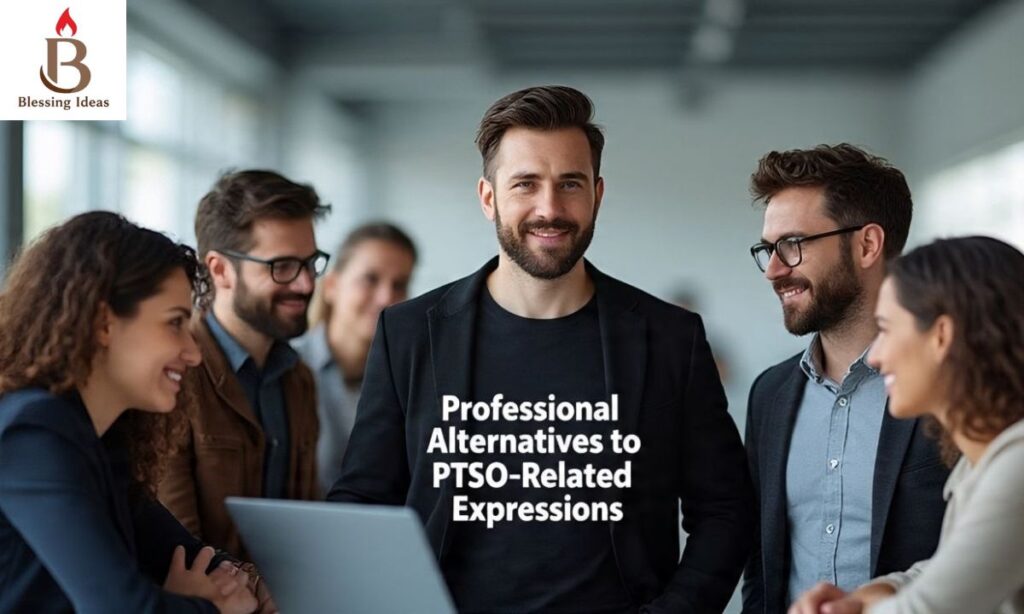Language continues to evolve rapidly in our digital age, with acronyms and abbreviations becoming essential elements of modern communication. One acronym that appears frequently across various contexts is “PTSO.”
Understanding what PTSO means can be crucial for effective communication in educational, professional, and social settings. In this comprehensive guide, we’ll explore the top 35 meanings of PTSO and provide you with polite, professional, and casual alternatives for different situations.
What Does PTSO Mean?
PTSO has multiple meanings depending on the context in which it’s used. Here are the top 35 interpretations of PTSO in 2025:
Educational Context:
- Parent Teacher Student Organization – The most common meaning in school settings
- Parent Teacher Support Organization – A variation focusing on support activities
- Parent Teacher School Organization – Emphasizing the school community aspect
Professional Context
- 4. Professional Training and Support Office – Corporate training departments
- 5. Project Team Support Organization – Business project management
- 6. Public Transportation Safety Office – Government safety departments
- 7. Personnel and Training Support Office – Military or government HR departments
Technology Context
- 8. Platform Technology Services Organization – IT service departments
- 9. Process and Technology Support Office – Business process improvement
- 10. Product Testing and Support Organization – Quality assurance teams
Healthcare Context
- 11. Patient Treatment Support Office – Hospital administration
- 12. Pharmacy and Therapeutics Support Organization – Medical institutions
- 13. Physical Therapy Services Office – Rehabilitation centers
Government Context
- 14. Public Transportation Service Office – Municipal departments
- 15. Property Tax Services Office – Local government offices
- 16. Police Training and Support Office – Law enforcement agencies
Business Context
- 17. Purchase and Trade Support Organization – Supply chain management
- 18. Program and Technical Support Office – Software companies
- 19. Project Tracking and Status Office – Project management departments
Non-Profit Context
- 20. Public and Third Sector Organization – Charitable organizations
- 21. Partnership and Trust Support Office – Community organizations
- 22. Poverty and Transition Support Office – Social services
Academic Context
- 23. Postgraduate and Teaching Support Office – University departments
- 24. Program and Tutorial Support Office – Educational institutions
- 25. Publication and Technical Support Office – Academic publishers
Military Context
- 26. Personnel and Training Standards Office – Armed forces administration
- 27. Procurement and Technical Support Office – Defense contractors
- 28. Planning and Tactical Support Office – Military operations
Religious Context
- 29. Parish and Temple Service Organization – Religious communities
- 30. Prayer and Teaching Support Office – Faith-based institutions
Sports Context
- 31. Physical Training and Sports Office – Athletic departments
- 32. Player and Team Support Organization – Sports management
Emergency Services
- 33. Public and Transportation Safety Office – Emergency response
- 34. Prevention and Treatment Support Office – Public health departments
- 35. Preparedness and Training Support Office – Disaster management
Polite Alternatives to PTSO-Related Expressions
When communicating in formal or respectful settings, consider these polite alternatives:
For Educational PTSO:
- Parent-Teacher Collaboration Committee
- Educational Support Partnership
- School Community Alliance
- Academic Advisory Council
- Student-Family Engagement Network
For Professional PTSO:
- Training and Development Department
- Support Services Division
- Professional Development Office
- Employee Assistance Program
- Organizational Support Team
Example Usage:
“The Educational Support Partnership has scheduled a meeting to discuss the upcoming fundraising initiatives for our school library renovation project.”
Professional Alternatives to PTSO-Related Expressions

In business and formal professional environments, these alternatives maintain credibility:
Corporate Settings:
- Strategic Support Services Division
- Operational Excellence Department
- Professional Development Institute
- Training and Competency Center
- Employee Relations Office
Government Agencies:
- Public Service Support Bureau
- Administrative Coordination Office
- Policy Implementation Division
- Community Engagement Department
- Service Delivery Enhancement Unit
Healthcare Institutions:
- Patient Care Coordination Office
- Clinical Support Services Department
- Healthcare Quality Improvement Division
- Patient Experience Enhancement Team
- Medical Staff Development Office
Example Usage:
“Our Strategic Support Services Division will be implementing new protocols to enhance cross-departmental collaboration and improve overall organizational efficiency.”
Casual Alternatives to PTSO-Related Expressions
For informal conversations and relaxed environments, try these friendly alternatives:
School-Related:
- Parent-Teacher Team
- School Support Crew
- Learning Community Group
- Education Squad
- School Helper Network
Workplace-Related:
- Support Team
- Helper Group
- Training Crew
- Development Squad
- Assistance Network
Community-Related:
- Volunteer Squad
- Community Helpers
- Support Circle
- Neighborhood Team
- Local Support Group
Example Usage:
“Hey! Are you planning to join the School Support Crew this semester? They’re organizing some really fun activities for the kids!”
How to Choose the Best Alternative
Selecting the appropriate alternative to PTSO requires careful consideration of several factors:
Context Analysis:
- Formal vs. Informal Setting: Business meetings require professional terminology, while casual conversations allow for friendlier language.
- Industry Specific: Healthcare, education, and technology sectors each have their preferred terminology.
Audience Consideration:
- Age Demographics: Younger audiences may prefer casual terms, while older professionals favor formal language.
- Educational Background: Adjust complexity based on your audience’s familiarity with technical terms.
- Cultural Sensitivity: Consider regional and cultural preferences in language use.
Communication Goals:
- Clarity: Choose terms that clearly convey your intended meaning.
- Engagement: Select alternatives that resonate with your specific audience.
- Professionalism: Match the formality level to your communication environment.
Platform Considerations:
- Email Communications: Professional alternatives work best.
- Text Messages: Casual alternatives are more appropriate.
- Official Documents: Formal alternatives maintain credibility.
Optimized Texting Examples
Here are practical examples for using PTSO alternatives in modern digital communication:
Professional Texting:
- “The Training and Development Department meeting has been rescheduled to next Tuesday at 2 PM.”
- “Please confirm your attendance at the Strategic Support Services Division workshop.”
- “Our Professional Development Office is launching a new certification program.”
Educational Texting: 4. “Don’t forget about the Parent-Teacher Collaboration Committee meeting tonight!” 5. “The School Community Alliance is hosting a bake sale this weekend.” 6. “Join our Educational Support Partnership for the annual fundraiser planning session.”
Casual Texting: 7. “Are you free to help with the School Support Crew activities this Saturday?” 8. “The Learning Community Group needs volunteers for the book fair setup.” 9. “Hey, the Support Team is meeting at the coffee shop to plan the next event.”
Emergency/Urgent Texting: 10. “Emergency meeting called by the Employee Relations Office regarding new policies.” 11. “Urgent: Patient Care Coordination Office needs immediate assistance with scheduling.” 12. “Quick update from the Community Engagement Department about tomorrow’s event.”
Follow-up Texting: 13. “Thanks for attending the Service Delivery Enhancement Unit presentation today!” 14. “Great ideas shared at the Training Crew meeting – let’s implement them soon.” 15. “The Support Circle really made a difference in today’s community event.”
Conclusion
Understanding the various meanings of PTSO and knowing how to express them appropriately in different contexts is essential for effective communication in 2025. Whether you’reparticipating in educational activities, conducting business meetings, or engaging in casual conversations, choosing the right terminology enhances clarity and maintains appropriate tone.
The 35 meanings of PTSO we’ve explored demonstrate the versatility and widespread use of this acronym across multiple industries and contexts. By utilizing the polite, professional, and casual alternatives provided, you can ensure your communication is both effective and contextually appropriate.






